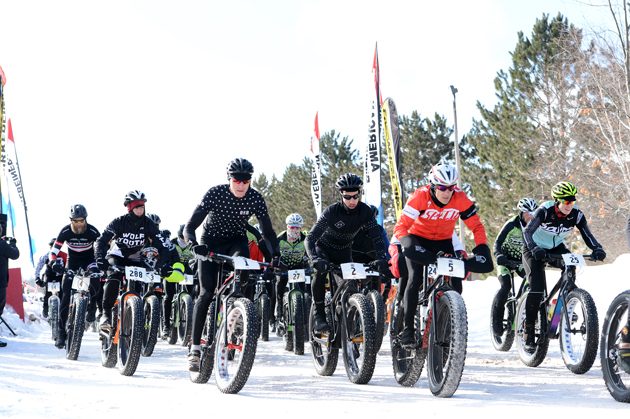Trail clubs in Wisconsin embracing fat bikes
Originally posted on February 13, 2015 at 14:41 pm
Courtesy of the Chequamegon Area Mountain Bike Association. Photos by Kelly Randolph.
Through the efforts of a dedicated group of volunteers and enthusiasts, winter fat biking has really begun to take off in the Chequamegon area of northern Wisconsin.
The most visible evidence is the Fat Bike Birkie, put on by the American Birkebeiner Ski Foundation in March, when the Birkie Trail will welcomes more than 700 fat bikers from across the country. The trail is also open to bikers the day before the event for training. The 2015 Fat Bike Birkie will take place on March 7.
Before the snow gets too deep, fat bikes can ride just about any of the Chequamegon Area Mountain Bike Association singletrack trails and pack them down as they go. But once there is a substantial amount of snow, the trails need to be mechanically packed and groomed to support the bikes.
An effort to groom winter bike trails in CAMBA country began in Seeley last winter with experimentation with old, smaller snowmobiles that could fit down the relatively narrow CAMBA singletrack. The CAMBA Esker Trail in Cable was also groomed by a regular sized snowmobile with a customized two-foot wide Tidd Tech groomer. Both met with some success, though the huge snows and considerable drifting atop the Esker led to that trail being abandoned this year.
Winter bike trail grooming is a new technology and best practices and equipment are still evolving. Last winter CAMBA hosted the Midwest Fat Bike summit, where presenters from around the upper Midwest shared their experiences and demonstrated various pieces of equipment. Because this is such a new activity, grooming techniques and equipment will need to continue to be perfected.

For the 2015 season, there are two groomed trails: the Seeley Trails and the CAMBA singletrack trail known as Seeley Pass. The Seeley Trails start near downtown Seeley on County Highway OO, just east of US Highway 63 and run through the Urenholdt Forest and on to county land. Seeley Pass starts off County Highway OO near the Birkie Trail and runs almost 12 miles to the intersection with the high point on the Birkie Trail. It is an out and back route. At this point, with more than 22 miles of groomed fat bike trails, the Chequamegon area may have one of the largest amounts of groomed winter biking trails in the Midwest.
The Seeley Trails were originally built by local resident and avid mountain biker, Tom Gaier. The singletrack system, intermixed with some double-track and ski trails, is about 10 to 12 miles in length, depending on which “route” is taken. Last year Jeff Schmid, also of Seeley, with Gaier’s assistance, started grooming the trails using a 1972 Ski Doo Elan with a hand-built drag. The Elan has a very narrow track and ski width, which allowed it to travel through the tight bike trails. Although a very simple machine with just a 12 horsepower engine, it was able to climb all of the steep hills, even with a foot of new snow. Schmid recently purchased a Rokon two-wheel drive motorcycle with which he is pulling a new mini-roller to pack the trail. The equipment and grooming techniques are still being dialed in as they learn more about the potential and limitations of the equipment and process.

As additional grooming volunteers and equipment become available, more groomed winter bike trails will be added to this menu. “We have numerous areas and trails that could make great fat biking trails and routes,” says Bergin. The only limiting factor will be the availability of individuals that can groom the trails and having the appropriate equipment.
Snow packed roads and other trails provide other good alternatives for places to ride a fat bike. CAMBA does not endorse riding on snowmobile trails for obvious safety reasons. At this time most groomed cross-country ski trails are not open to fat bikes. It is widely acknowledged that once a ski trail has firmed up, a fat bike will not do any damage to the trail. However it is more of an issue of user conflict when potentially mixing the uses.
Recently an enthusiastic group of leaders from the local fat biking community emerged with a goal of moving winter biking forward and creating more places for fat bike enthusiasts to ride. “CAMBA is really encouraged by the energy and passion this group has brought to the effort to develop winter biking in the Chequamegon area,” said Ron Bergin, CAMBA executive director. “We look forward to helping make our area a premiere fat biking destination.”
An overview of winter fat biking can be found on the CAMBA website along with trail grooming reports and an opportunity to donate to support winter fat biking in the Chequamegon area.
It is only the beginning of the fat biking movement in the Chequamegon area. CAMBA and local fat bike enthusiasts fully expect the sport to grow rapidly and quite possibly be the next big thing for the area.